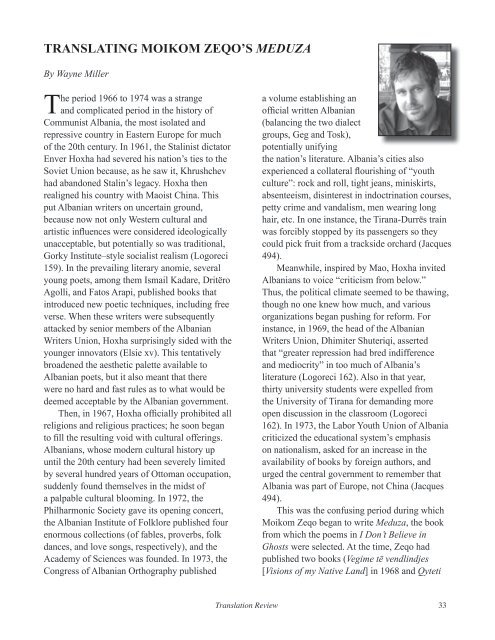Table of contents - The University of Texas at Dallas
Table of contents - The University of Texas at Dallas
Table of contents - The University of Texas at Dallas
Create successful ePaper yourself
Turn your PDF publications into a flip-book with our unique Google optimized e-Paper software.
TRANSLATING MOIKOM ZEQO’S MEDUZA<br />
By Wayne Miller<br />
<strong>The</strong> period 1966 to 1974 was a strange<br />
and complic<strong>at</strong>ed period in the history <strong>of</strong><br />
Communist Albania, the most isol<strong>at</strong>ed and<br />
repressive country in Eastern Europe for much<br />
<strong>of</strong> the 20th century. In 1961, the Stalinist dict<strong>at</strong>or<br />
Enver Hoxha had severed his n<strong>at</strong>ion’s ties to the<br />
Soviet Union because, as he saw it, Khrushchev<br />
had abandoned Stalin’s legacy. Hoxha then<br />
realigned his country with Maoist China. This<br />
put Albanian writers on uncertain ground,<br />
because now not only Western cultural and<br />
artistic influences were considered ideologically<br />
unacceptable, but potentially so was traditional,<br />
Gorky Institute–style socialist realism (Logoreci<br />
159). In the prevailing literary anomie, several<br />
young poets, among them Ismail Kadare, Dritëro<br />
Agolli, and F<strong>at</strong>os Arapi, published books th<strong>at</strong><br />
introduced new poetic techniques, including free<br />
verse. When these writers were subsequently<br />
<strong>at</strong>tacked by senior members <strong>of</strong> the Albanian<br />
Writers Union, Hoxha surprisingly sided with the<br />
younger innov<strong>at</strong>ors (Elsie xv). This tent<strong>at</strong>ively<br />
broadened the aesthetic palette available to<br />
Albanian poets, but it also meant th<strong>at</strong> there<br />
were no hard and fast rules as to wh<strong>at</strong> would be<br />
deemed acceptable by the Albanian government.<br />
<strong>The</strong>n, in 1967, Hoxha <strong>of</strong>ficially prohibited all<br />
religions and religious practices; he soon began<br />
to fill the resulting void with cultural <strong>of</strong>ferings.<br />
Albanians, whose modern cultural history up<br />
until the 20th century had been severely limited<br />
by several hundred years <strong>of</strong> Ottoman occup<strong>at</strong>ion,<br />
suddenly found themselves in the midst <strong>of</strong><br />
a palpable cultural blooming. In 1972, the<br />
Philharmonic Society gave its opening concert,<br />
the Albanian Institute <strong>of</strong> Folklore published four<br />
enormous collections (<strong>of</strong> fables, proverbs, folk<br />
dances, and love songs, respectively), and the<br />
Academy <strong>of</strong> Sciences was founded. In 1973, the<br />
Congress <strong>of</strong> Albanian Orthography published<br />
a volume establishing an<br />
<strong>of</strong>ficial written Albanian<br />
(balancing the two dialect<br />
groups, Geg and Tosk),<br />
potentially unifying<br />
the n<strong>at</strong>ion’s liter<strong>at</strong>ure. Albania’s cities also<br />
experienced a coll<strong>at</strong>eral flourishing <strong>of</strong> “youth<br />
culture”: rock and roll, tight jeans, miniskirts,<br />
absenteeism, disinterest in indoctrin<strong>at</strong>ion courses,<br />
petty crime and vandalism, men wearing long<br />
hair, etc. In one instance, the Tirana-Durrës train<br />
was forcibly stopped by its passengers so they<br />
could pick fruit from a trackside orchard (Jacques<br />
494).<br />
Meanwhile, inspired by Mao, Hoxha invited<br />
Albanians to voice “criticism from below.”<br />
Thus, the political clim<strong>at</strong>e seemed to be thawing,<br />
though no one knew how much, and various<br />
organiz<strong>at</strong>ions began pushing for reform. For<br />
instance, in 1969, the head <strong>of</strong> the Albanian<br />
Writers Union, Dhimiter Shuteriqi, asserted<br />
th<strong>at</strong> “gre<strong>at</strong>er repression had bred indifference<br />
and mediocrity” in too much <strong>of</strong> Albania’s<br />
liter<strong>at</strong>ure (Logoreci 162). Also in th<strong>at</strong> year,<br />
thirty university students were expelled from<br />
the <strong>University</strong> <strong>of</strong> Tirana for demanding more<br />
open discussion in the classroom (Logoreci<br />
162). In 1973, the Labor Youth Union <strong>of</strong> Albania<br />
criticized the educ<strong>at</strong>ional system’s emphasis<br />
on n<strong>at</strong>ionalism, asked for an increase in the<br />
availability <strong>of</strong> books by foreign authors, and<br />
urged the central government to remember th<strong>at</strong><br />
Albania was part <strong>of</strong> Europe, not China (Jacques<br />
494).<br />
This was the confusing period during which<br />
Moikom Zeqo began to write Meduza, the book<br />
from which the poems in I Don’t Believe in<br />
Ghosts were selected. At the time, Zeqo had<br />
published two books (Vegime të vendlindjes<br />
[Visions <strong>of</strong> my N<strong>at</strong>ive Land] in 1968 and Qyteti<br />
Transl<strong>at</strong>ion Review 33

















